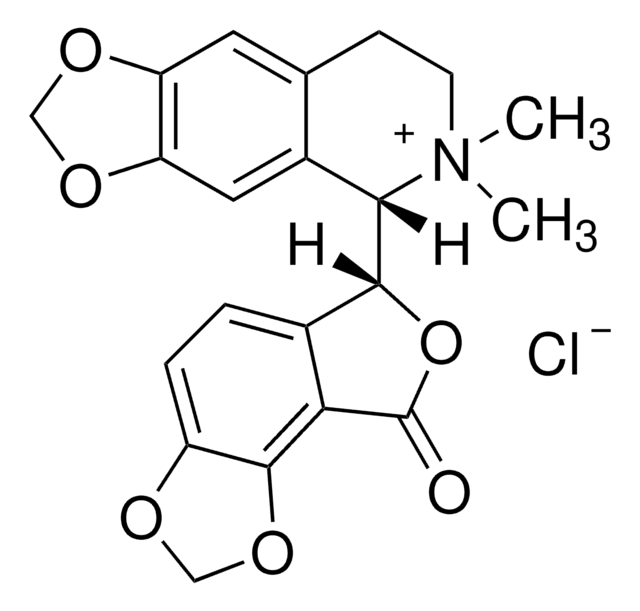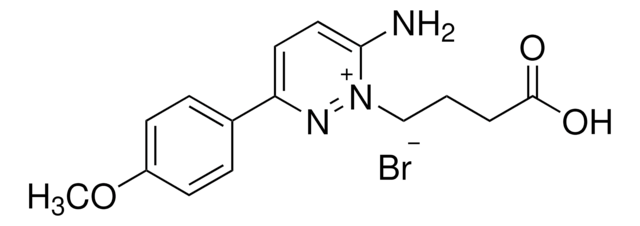14340
(+)-Bicuculline
≥97.0% (TLC)
Synonyme(s) :
Bucuculline
About This Item
Produits recommandés
Niveau de qualité
Pureté
≥97.0% (TLC)
Forme
powder
Activité optique
[α]20/D +126±6°, c = 1% in chloroform
Pf
193-197 °C
Chaîne SMILES
[H][C@]1(OC(=O)c2c3OCOc3ccc12)[C@@]4([H])N(C)CCc5cc6OCOc6cc45
InChI
1S/C20H17NO6/c1-21-5-4-10-6-14-15(25-8-24-14)7-12(10)17(21)18-11-2-3-13-19(26-9-23-13)16(11)20(22)27-18/h2-3,6-7,17-18H,4-5,8-9H2,1H3/t17-,18+/m0/s1
Clé InChI
IYGYMKDQCDOMRE-ZWKOTPCHSA-N
Informations sur le gène
rat ... Gabra2(29706)
Vous recherchez des produits similaires ? Visite Guide de comparaison des produits
Description générale
Application
- as a compound to compare pharmacodynamics and network activity profiles of conolidine/cannabidiol
- to study the effects of chronic caffeine administration on the function of GABAA receptor
- to isolate N-methyl-D-aspartate receptor (NMDAR)-specific evoked and miniature excitatory postsynaptic currents (eEPSCs and mEPSCs) in neurons of rats
Actions biochimiques/physiologiques
Caractéristiques et avantages
Mention d'avertissement
Danger
Mentions de danger
Conseils de prudence
Classification des risques
Acute Tox. 2 Dermal - Acute Tox. 2 Inhalation - Acute Tox. 2 Oral - Aquatic Acute 1
Code de la classe de stockage
6.1A - Combustible acute toxic Cat. 1 and 2 / very toxic hazardous materials
Classe de danger pour l'eau (WGK)
WGK 3
Point d'éclair (°F)
Not applicable
Point d'éclair (°C)
Not applicable
Équipement de protection individuelle
Eyeshields, Faceshields, Gloves, type P2 (EN 143) respirator cartridges
Faites votre choix parmi les versions les plus récentes :
Déjà en possession de ce produit ?
Retrouvez la documentation relative aux produits que vous avez récemment achetés dans la Bibliothèque de documents.
Les clients ont également consulté
Notre équipe de scientifiques dispose d'une expérience dans tous les secteurs de la recherche, notamment en sciences de la vie, science des matériaux, synthèse chimique, chromatographie, analyse et dans de nombreux autres domaines..
Contacter notre Service technique













